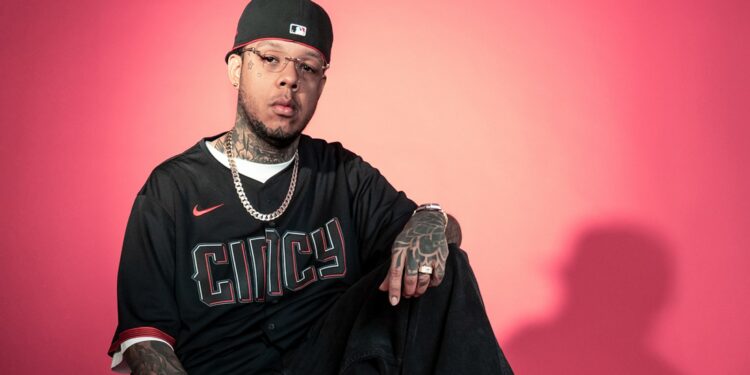T
he Venezuelan rapper Akapellah was about 10 yers old when he came across a street vendor selling a bootleg copy of Tego CalderonŌĆÖs 2003 album, El Abayarde. Struck by the cover ŌĆö a black image of the Puerto Rican artist wearing sunglasses, his afro haloed in red ŌĆö Akapellah bought the record and took it home. From the second he listened to it, he was mesmerized. ŌĆ£His rapping was exceptional,ŌĆØ Akapellah remembers. ŌĆ£The percussion, the topic of his Blackness ŌĆ” it captivated me.ŌĆØ┬Ā
He decided he wanted to pursue rap himself and quickly began learning everything he could about hip hop. He dove deep into U.S. rap history: He became a massive fan of Biggie Smalls, Mos Def, Wu-Tang Clan, and A Tribe Called Quest. Jazz rap, boom bap, gangsta rap, all of it drew him in. ŌĆ£I started to understand there was southern rap, that in Atlanta they did rap this way, that in California it was different,ŌĆØ he says. ŌĆ£That there was Northside and Southside, east coast and west coast. I started to understand all the codes and styles, and I fell in love.ŌĆØ
As a teenager, he finally wrote his first song: a Spanish version of a Jagged Edge track heŌĆÖd heard on MTV, amped up with some of his own lyricism. Once he was done, he persuaded his mom to pay for time at a local studio to record it. Somehow, she agreed and dropped him off at his first session. When she picked him up, she stared at the producer and asked one question: ŌĆ£So, is he good?ŌĆØ The producer assured her that he was.
Akapellah had grown up playing lots of different instruments. His mom took him to tuba and mandolin lessons when he was a kid, and he spent a few years learning to play drums. As his interest in rap expanded, he explored VenezuelaŌĆśs local scene, performing with other rappers and becoming a standout in the country. His mother wasnŌĆÖt surprised when a few years into college, where he was studying journalism, he dropped out to pursue music full-time. ŌĆ£My mom and I always had really great communication, and she knows IŌĆÖve always been an extremist. When I started to get into rap, I never stopped doing it. I showed her I was taking it seriously.ŌĆØ
EditorŌĆÖs picks
But in his twenties, economic and sociopolitical turmoil struck Venezuela. The country entered an economic recession in 2014, with an inflation rate of 800 percent by 2016.mIt got harder to live in the country, particularly for musicians, so eventually, Akapellah left. He lived in Colombia for a few years before eventually settling down in Argentina, where heŌĆÖs based now. His moves across Latin America not only reflects the migratory experiences of Venezuelans today, but has also come to define the countryŌĆÖs rap sound, which started to pick up influences from scenes in other places. ŌĆ£The knowledge we picked up let us make rap that was more international, that understood the cultural context of rap movements in other countries,ŌĆØ he says. ŌĆ£Perhaps before that, the Venezuelan rap scene had been more local. But we started going around and seeing how other parts of Latin America were doing things.ŌĆØ
AkapellahŌĆÖs discography showcases some of that movement: His first few albums are straight-ahead rap, filled with his observations about life in Venezuela and collaborations with local rappers. Later records, like Goldo Funky from 2020, start to get more experimental across genres as he dabbled into trap and reggaeton-adjacent beats, unafraid to keep up with younger artists coming up at the time.
Trending
But one of his most acclaimed projects came in 2022, smack dab in the middle of the pandemic. HeŌĆÖd been living in New York City when the world shut down. Akapellah was in bad shape at the time and he began to fear getting Covid; he started suffering from major panic attacks and anxiety. The only thing that helped was writing music, so he began recording Respira ŌĆö or ŌĆ£breathe,ŌĆØ something heŌĆÖd say to himself over and over during his panic attacks. He ended up tattooing the word directly on his face as a daily reminder. The albumŌĆÖs cover shows him in the middle of a panic attack, the word visible on his forehead.
Akapellah has kept experimenting freely. But his latest album, Pedro Elias, released in April, was a journey back home. ŌĆ£I said, ŌĆśWhat if I go back and make an album that sounds like Venezuela?ŌĆÖŌĆØ The project reflects national pride. ŌĆ£You meet Venezuelan kids who grew up outside the country, and theyŌĆÖre like, ŌĆśWhere are you from?ŌĆÖ ŌĆśIŌĆÖm from Maracay.ŌĆÖ And theyŌĆÖre like, ŌĆśThatŌĆÖs awesome!ŌĆÖŌĆØ┬Ā
Source link : http://www.bing.com/news/apiclick.aspx?ref=FexRss&aid=&tid=66ec24ae83e44f8fb04f60f51b9e92c7&url=https%3A%2F%2Fwww.rollingstone.com%2Fmusic%2Fmusic-latin%2Fakapellah-pedro-elias-interview-1235105934%2F&c=14571665545638990640&mkt=en-us
Author :
Publish date : 2024-09-19 02:01:00
Copyright for syndicated content belongs to the linked Source.












